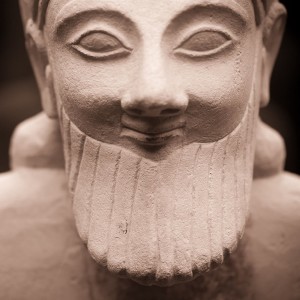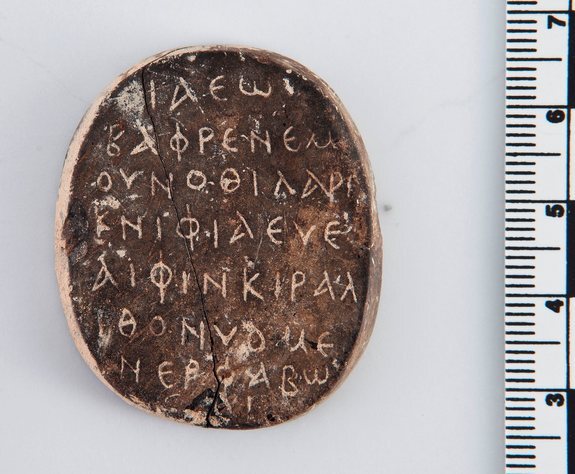The History of Cyprus Podcast
Welcome to The History of Cyprus Podcast -- a monthly series exploring the island’s past from 10,000 BCE to the 20th century. Each episode features in-depth conversations with leading scholars in archaeology, linguistics, political and social history, bringing academic insight to a wide audience. Together, we uncover the languages, cultures, conflicts, and legacies that shaped one of the Mediterranean’s most storied crossroads. Whether you’re a student, a history enthusiast, or just curious about Cyprus, this podcast offers something for everyone -- rooted in research, driven by storytelling. If you’d like to reach me, my name is Andreas. Please feel free to send me an email at cyprusthepodcast@gmail.com --------------------------------------------------------------- Follow The History of Cyprus Podcast Instagram and support the show on Patreon: https://www.patreon.com/TheHistoryofCyprusPodcast https://instagram.com/thehistoryofcyprus *The podcast image, ”Dressed for the Gods” (250BC) is from the British Museum taken by William Warby. Check out more of his work at flickr.com/photos/wwarby/
Episodes

Wednesday Jul 02, 2025
Wednesday Jul 02, 2025
The history of archaeology in Cyprus started with a focus on collecting ancient objects, which influenced how archaeology was done on the island into the 1900s. In the 1800s and 1900s, foreign expeditions came to Cyprus to dig up artifacts, but this also led to illegal digging and private collections, both on the island and in the West. My guest this month, Luca Bombardieri (Director of the Erimi Archaeological Project in Cyprus) looks at the time when Europeans first became really interested in Cypriot history, moving from just writing about it to collecting actual objects. It focuses on three Italian travelers in the late 1700s (Giovanni Mariti, Domenico Sestini and Antonio Mondaini) exploring how their discoveries and actions shaped the way people understood and handled Cypriot artifacts over the next 200 years.

Sunday Jun 15, 2025
Sunday Jun 15, 2025
Giovanni Mariti (1736–1806) was an Italian traveler best known for his detailed accounts of the Eastern Mediterranean, particularly Cyprus, during the 18th century. Born in Florence, Mariti served as an official in the service of the Grand Duchy of Tuscany, and his travels provided him with firsthand insights into the social, political, and economic life of the regions he visited. He stayed in Cyprus for seven years and served as an official in the Tuscan consulate in Larnaca. His most notable work, Travels in the Island of Cyprus, written in the late 18th century, is a rich source of information on the customs, governance, and history of Cyprus under Ottoman rule -- particularly in the earliest excavations on the island. In this excerpt, we hear from Mariti as he discusses some interesting finds in and around Larnaca. This excerpt is a perfect springboard into my next month's guest, Luca Bombardieri (Director of the Erimi Archaeological Project) as we discuss early archaeology in his latest publication, "From Exploration to Exploitation: Giovanni Mariti, Domenico Sestini, Antonio Mondaini and the Early History of Cypriot Archaeology."

Monday Jun 02, 2025
Monday Jun 02, 2025
The Bouliler brothers are emblematic figures of banditry amidst a backdrop of economic struggle and social change. Hasan Bulli, a Turkish Cypriot from Paphos, became a legendary folk hero in Cyprus in the late 19th century. Often compared to American outlaws like Jesse James, he gained notoriety for his bold actions and was remembered through songs and tales long after his death. His life changed after his love for Emete, his uncle's wife, and a conflict with a fellow outlaw, Hayreddin. After a failed ambush attempt on Hayreddin—who had allegedly harassed Emete—Hasan was framed and sentenced to prison for a crime he denied committing.
Hasan was convicted and fled to the mountains, where he spent 18 months as a fugitive. His brothers Kaymakam and Hüseyin also became fugitives after being accused of murder. They formed a gang and operated in the mountains until 1896 where they were ultimately captured and killed.
But who were the Bullis? And how do we separate fact from fiction? Through a balanced lens, Professor Mehmet Demiryürek (Hitit University) examines the reality behind the legends, exploring the socio-economic conditions of the period, the Bouliler's deeds and misdeeds, and their enduring impact on modern Cypriot memory.

Thursday May 15, 2025
Thursday May 15, 2025
Hasan Bulli is a significant figure in the history of Cyprus. A notorious bandit who roamed the island’s rural landscape in the late 19th century, he became something of a folk hero--often compared to Jesse James. His daring deeds and the stories surrounding his gang became the stuff of legend in Cypriot folklore. Turkish Cypriot poet Hafız Cemaleddin immortalized them in a poem titled Cyprus Bandit under the British Rule published on June 21, 1896.
Next month, join The History of Cyprus Podcast as I welcome Dr. Mehmet Demiryürek to discuss brigands and bandits in 19th-century Cyprus!

Saturday May 10, 2025
Saturday May 10, 2025
For this bonus episode, I interview Jan Coenaerts and Polte De Weirdt from Vrije University in Belgium as they embark on their next season at The Hala Sultan Tekke Hinterland Survey Project (HST-HASP). They use archaeological survey and landscape analysis to reassess spatial organization at Dromolaxia-Vyzakia (13th–12th century BCE Late Bronze Age harbour town) in order to reconstruct its long-term settlement dynamics, revealing that the Late Bronze Age settlement at Dromolaxia-Vyzakia was larger and more dispersed than previously thought.

Friday May 02, 2025
Friday May 02, 2025
In this interview, we delve into the past with bioarchaeologist, Sherry Fox (Arizona State University), as we explore how bioarchaeologists utilize technology to reconstruct the lives of ancient inhabitants, identify various ailments they suffered and how studying even their teeth can unveil details about their occupations. We'll explore a variety of subjects, including cranial modification practices in Cyprus(!), the evolution of burial customs throughout centuries, and the ethical considerations surrounding the preservation of human remains.

Tuesday Apr 15, 2025
Tuesday Apr 15, 2025
Luigi Palma Di Cesnola is a controversial figure in Cypriot history. Born in Turin in 1832, he served in the First Italian War of Independence and later in the Crimean War. In 1858, he left Italy for the United States where his service in U.S. Civil War earned him distinction. He was later appointed as a consul in Larnaca where he engaged in wide-spread excavations (which many have considered tantamount to looting). Most of his finds were purchased by the Metropolitan Museum of Art where he served as its first director. His finds can still be seen there to this day. This excerpt was taken from his book, "Cyprus: Its Ancient Cities, Tombs and Temples" where he describes one of the many tombs across Cyprus. This, of course, being the perfect introduction to next month's guest, Dr. Sherry Fox, where we discuss changing burial customs in Cyprus from the very ancient to the present. Next month: Bones, Burials and Bioarchaeology!Here is the text in full:"West of these tombs, I discovered nine oven-shaped caverns, containing such a quantity of bones that I was extremely curious to examine one thoroughly. Accordingly, the earth was removed and I counted no less than sixty-four human skulls. These nine caverns would have been infinitely too small to contain the amount of bodies indicated and I believe therefore that they were ossuaries for bones, removed from the rock-cut tombs to make way for other bodies. There was a platform made of sun-dried bricks and upon the platform the dead were laid, with the head always towards the entrance. These tombs were made to contain in most cases three bodies, yet in many of them the remains of two, one on the right and the other on the left of the doorway. In some few instances a reversed earthenware plate was found placed under the head, serving as a pillow to the dead."Luigi Palma Di Cesnola - Cyprus Its Ancient Cities, Tombs and Temples, 1877"

Saturday Apr 05, 2025
Saturday Apr 05, 2025
Hello everyone! Thank you as always for tuning in. I've got a lot of great episodes planned that will take us well into 2026! Have a listen!But I'm also writing to ask for your support. If you enjoy the show or any particular episode, please consider taking some time to leave a review online. Positive reviews help grow the podcast and spread the word. And as always, you can always join as a Patron! For as little as $1 a month, you can help keep the podcast ad free and support the creation of new and exciting Primary Sources! And don't forget, follow The History of Cyprus Podcast on Instagram!

Wednesday Apr 02, 2025
Wednesday Apr 02, 2025
The impact of the Second World War was far-reaching -- Cyprus included. While initial reactions to the war were muted, the dynamic shifted dramatically when Greece entered the fray, spurring Cypriots to enlist in large numbers to serve King and Country. Much like in World War I, many Cypriots served as muleteers, but this time, direct action was far more likely. Thousands of Greek, Turkish, Armenian and Maronite Cypriots were deployed across the globe, including Egypt, Greece, and, most notably, Monte Cassino, Italy. They were among those evacuated at Dunkirk, flew missions with the RAF, and tragically, some even perished in concentration camps.
The Cypriot war dead are commemorated in 23 different countries and across 72 cenotaphs, with notable locations including France, Germany, Poland -- and as far afield as Singapore and China. Italy holds the largest number of Cypriot graves, with volunteers interred in 18 separate cemeteries. But the war also left its mark on Cyprus itself, with the island enduring air raids, social change -- and even bombings. It may even hold the distinction of being the only allied country to "suffer air raids on the same day by three different air forces." (William Battershill, Governor of Cyprus 1939-1941).
How were Cypriots trained for service? Who was recruited, and what challenges did they face upon their return? To explore these questions and more, I’m joined by Dr. Marios Siammas to discuss Cyprus in the Second World War!

Saturday Mar 15, 2025
Saturday Mar 15, 2025
The Battle of Monte Cassino (1944) was a series of Allied assaults on heavily fortified German positions in central Italy, centered around the ancient Benedictine monastery of Monte Cassino. Capturing Monte Cassino would weaken Germany's grasp in Italy and open the way to Rome. Cypriot muleteers played a pivotal role in overcoming the rugged terrain and essential for the Allied Effort. Nightly, hundreds of mules carried critical supplies—such as water, rations, grenades, ammunition, and medical materials—to front-line positions, braving relentless mortar attacks. On their return, they transported the wounded to aid stations.
In this dramatization, we hear from Georgios Christofi whose mule (and many other war animals) died on the slopes of Monte Cassino. The efforts of the mule companies were instrumental in securing victory at Monte Cassino. Despite constant fire, they ensured essential supplies reached the forward positions, allowing Allied forces to sustain their offensive. Their adaptability, along with lessons from previous campaigns, proved crucial in navigating and succeeding in Italy's harsh mountainous terrain.











